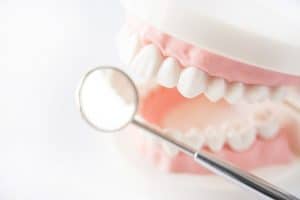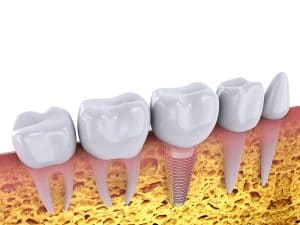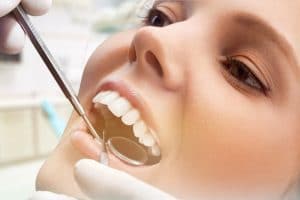 One of the reasons why periodontal (gum) disease affects so many people before they notice it is because the disease occurs in stages. The first, known as gingivitis, doesn’t always produce obvious symptoms, and patients who skip a checkup and cleaning miss the chance for their dentists to more thoroughly check for it. In its more advanced stages, gum disease is often irreversible, which means even after you do notice it and seek treatment, it may be present for the rest of your life. Today, we examine how we help patients in Encinitas/San Diego by diagnosing their specific periodontal disease and designing treatment options specifically for them. (more…)
One of the reasons why periodontal (gum) disease affects so many people before they notice it is because the disease occurs in stages. The first, known as gingivitis, doesn’t always produce obvious symptoms, and patients who skip a checkup and cleaning miss the chance for their dentists to more thoroughly check for it. In its more advanced stages, gum disease is often irreversible, which means even after you do notice it and seek treatment, it may be present for the rest of your life. Today, we examine how we help patients in Encinitas/San Diego by diagnosing their specific periodontal disease and designing treatment options specifically for them. (more…)
Why Inflammation Makes Periodontal Disease Such a Threat
 One of the reasons why periodontal disease is such a threat is because it’s the leading cause of adult tooth loss. When left untreated, it can lead to severe erosion of your periodontal tissues and jawbone structure, leaving teeth without adequate support. The driving force behind this erosion is harmful oral bacteria – particularly, the inflammation that certain microbes incite throughout your periodontal and oral tissues. Besides tooth loss, patients in Encinitas/San Diego can also be at heightened risk for other chronic health issues thanks to this uncontrolled inflammation, which is another significant reason why periodontal disease is such a threat. (more…)
One of the reasons why periodontal disease is such a threat is because it’s the leading cause of adult tooth loss. When left untreated, it can lead to severe erosion of your periodontal tissues and jawbone structure, leaving teeth without adequate support. The driving force behind this erosion is harmful oral bacteria – particularly, the inflammation that certain microbes incite throughout your periodontal and oral tissues. Besides tooth loss, patients in Encinitas/San Diego can also be at heightened risk for other chronic health issues thanks to this uncontrolled inflammation, which is another significant reason why periodontal disease is such a threat. (more…)
Bad Breath, and Other Symptoms of Gum Disease
 Bad breath is one of the more common dental health concerns that you may experience, but it’s also one of the most commonly benign symptoms. For instance, your breath may be bad in the morning simply because oral bacteria have gathered more easily overnight (thanks to reduced saliva). However, bad breath that doesn’t go away is often more serious than just morning breath. For many patients in Encinitas/San Diego, it could be one of many potential symptoms of a serious condition, such as periodontal disease. (more…)
Bad breath is one of the more common dental health concerns that you may experience, but it’s also one of the most commonly benign symptoms. For instance, your breath may be bad in the morning simply because oral bacteria have gathered more easily overnight (thanks to reduced saliva). However, bad breath that doesn’t go away is often more serious than just morning breath. For many patients in Encinitas/San Diego, it could be one of many potential symptoms of a serious condition, such as periodontal disease. (more…)
How to Boost Your Chances of Preventing Tooth Loss
 The tricky thing about your dental health is that it’s dynamic. Your smile may be as healthy as possible one day, and then be at a high risk of tooth loss just a few months later. That’s especially true if you have periodontal disease, which is the leading cause of tooth loss for adults in the United States. Fortunately, tooth loss doesn’t always have to happen, and your risks for it don’t have to fluctuate. With consistently good hygiene, regular preventive care from your dentist, and expert periodontal treatment when necessary, patients in Encinitas/San Diego can significantly boost their chances of preventing tooth loss. (more…)
The tricky thing about your dental health is that it’s dynamic. Your smile may be as healthy as possible one day, and then be at a high risk of tooth loss just a few months later. That’s especially true if you have periodontal disease, which is the leading cause of tooth loss for adults in the United States. Fortunately, tooth loss doesn’t always have to happen, and your risks for it don’t have to fluctuate. With consistently good hygiene, regular preventive care from your dentist, and expert periodontal treatment when necessary, patients in Encinitas/San Diego can significantly boost their chances of preventing tooth loss. (more…)
A Brief Look at Laser Periodontal Treatment
 Preventing periodontal disease is fairly straight forward. For instance, because it develops from oral bacteria, preventing these bacteria from gathering and remaining on your gums can significantly reduce your risks of developing periodontal disease. However, cleanliness isn’t a full-proof guarantee against periodontal disease, and when it does develop, treating it may not always be as simple as removing harmful oral bacteria. For example, in addition to deep periodontal cleaning, your treatment might also include specialized maintenance, such as the laser-assisted new attachment procedure (LANAP). The use of advanced laser technology helps patients in Encinitas/San Diego more comfortably and successfully treat periodontal disease and manage its risks to their oral health. (more…)
Preventing periodontal disease is fairly straight forward. For instance, because it develops from oral bacteria, preventing these bacteria from gathering and remaining on your gums can significantly reduce your risks of developing periodontal disease. However, cleanliness isn’t a full-proof guarantee against periodontal disease, and when it does develop, treating it may not always be as simple as removing harmful oral bacteria. For example, in addition to deep periodontal cleaning, your treatment might also include specialized maintenance, such as the laser-assisted new attachment procedure (LANAP). The use of advanced laser technology helps patients in Encinitas/San Diego more comfortably and successfully treat periodontal disease and manage its risks to their oral health. (more…)
Important Things to Remember About Dental Implants
 When you experience tooth loss, the condition can result in several different long-term concerns for your smile. That’s because, to remain healthy and fully functional, your bite requires a full set of teeth to work with. While conventional dental prostheses like dental bridges and dentures can replace the parts of your teeth responsible for biting and chewing, the addition of dental implants gives them the ability to rebuild your smile more comprehensively. Implant posts, which are fashioned to replace lost teeth roots, can be used to support a prosthesis of any size (i.e., dental crown, bridge, or denture) with enhanced support and stimulation for your smile. (more…)
When you experience tooth loss, the condition can result in several different long-term concerns for your smile. That’s because, to remain healthy and fully functional, your bite requires a full set of teeth to work with. While conventional dental prostheses like dental bridges and dentures can replace the parts of your teeth responsible for biting and chewing, the addition of dental implants gives them the ability to rebuild your smile more comprehensively. Implant posts, which are fashioned to replace lost teeth roots, can be used to support a prosthesis of any size (i.e., dental crown, bridge, or denture) with enhanced support and stimulation for your smile. (more…)
3 Reasons Why Good Hygiene Matters So Much
 Along with attending preventive dental visits at least twice a year, successfully preventing oral and periodontal diseases requires heavily on your own daily efforts at home. If your hygiene routine is lacking, then even the best oral health care may not be able to help you preserve your smile or avoid the need for extensive treatment. Today, we explain why good hygiene matters so much to the long-term health and integrity of your smile, and how it forms the basis for habits that will increase your chances of avoiding oral health troubles. (more…)
Along with attending preventive dental visits at least twice a year, successfully preventing oral and periodontal diseases requires heavily on your own daily efforts at home. If your hygiene routine is lacking, then even the best oral health care may not be able to help you preserve your smile or avoid the need for extensive treatment. Today, we explain why good hygiene matters so much to the long-term health and integrity of your smile, and how it forms the basis for habits that will increase your chances of avoiding oral health troubles. (more…)
The Details of Periodontal Scaling and Root Planing
 Deep cleaning, or scaling and root planing, is similar to regular dental cleaning. Both involve removing harmful oral bacteria from your teeth and/or oral tissues, and both are necessary to preventing extensive oral or periodontal disease. The difference is that everyone requires routine dental cleanings, typically at least twice a year, even when their teeth and gums are healthy. However, your Encinitas/San Diego periodontist will only recommend scaling and root planing if you’re at an increased risk of gum disease, or if gingivitis (early gum disease) has already developed. (more…)
Deep cleaning, or scaling and root planing, is similar to regular dental cleaning. Both involve removing harmful oral bacteria from your teeth and/or oral tissues, and both are necessary to preventing extensive oral or periodontal disease. The difference is that everyone requires routine dental cleanings, typically at least twice a year, even when their teeth and gums are healthy. However, your Encinitas/San Diego periodontist will only recommend scaling and root planing if you’re at an increased risk of gum disease, or if gingivitis (early gum disease) has already developed. (more…)
Who’s Most at Risk for Periodontal Disease?
 The thing about periodontal disease, or gum disease, is that it can affect nearly anyone at certain points in their lives. The disease, which affects over 70% of adults in the United States, develops from an excess of harmful oral bacteria, which reside in everyone’s mouth. This means the building blocks of periodontal disease are already there, so to prevent it, you have to actively prevent those bacteria from infecting your gums. Today, we help make that easier by taking a look at what could make you more at-risk for periodontal disease, and how you can avoid them. (more…)
The thing about periodontal disease, or gum disease, is that it can affect nearly anyone at certain points in their lives. The disease, which affects over 70% of adults in the United States, develops from an excess of harmful oral bacteria, which reside in everyone’s mouth. This means the building blocks of periodontal disease are already there, so to prevent it, you have to actively prevent those bacteria from infecting your gums. Today, we help make that easier by taking a look at what could make you more at-risk for periodontal disease, and how you can avoid them. (more…)
Why Healthy Teeth Need Healthy Gums
 Most people recognize the main tenets of keeping their teeth healthy. For instance, preventing issues like tooth decay and tooth loss requires keeping harmful oral bacteria bay. That requires brushing your teeth at least twice a day, flossing at least once a day, and attending dental checkups and cleanings as often as the dentist recommends. However, not everyone recognizes the importance of healthy gums to the health and integrity of their teeth and the rest of their smiles. Today, we examine why patients in Encinitas/San Diego need healthy gums to maintain their natural smiles for life, and what they can do if their periodontal health is threatened by gum disease. (more…)
Most people recognize the main tenets of keeping their teeth healthy. For instance, preventing issues like tooth decay and tooth loss requires keeping harmful oral bacteria bay. That requires brushing your teeth at least twice a day, flossing at least once a day, and attending dental checkups and cleanings as often as the dentist recommends. However, not everyone recognizes the importance of healthy gums to the health and integrity of their teeth and the rest of their smiles. Today, we examine why patients in Encinitas/San Diego need healthy gums to maintain their natural smiles for life, and what they can do if their periodontal health is threatened by gum disease. (more…)



